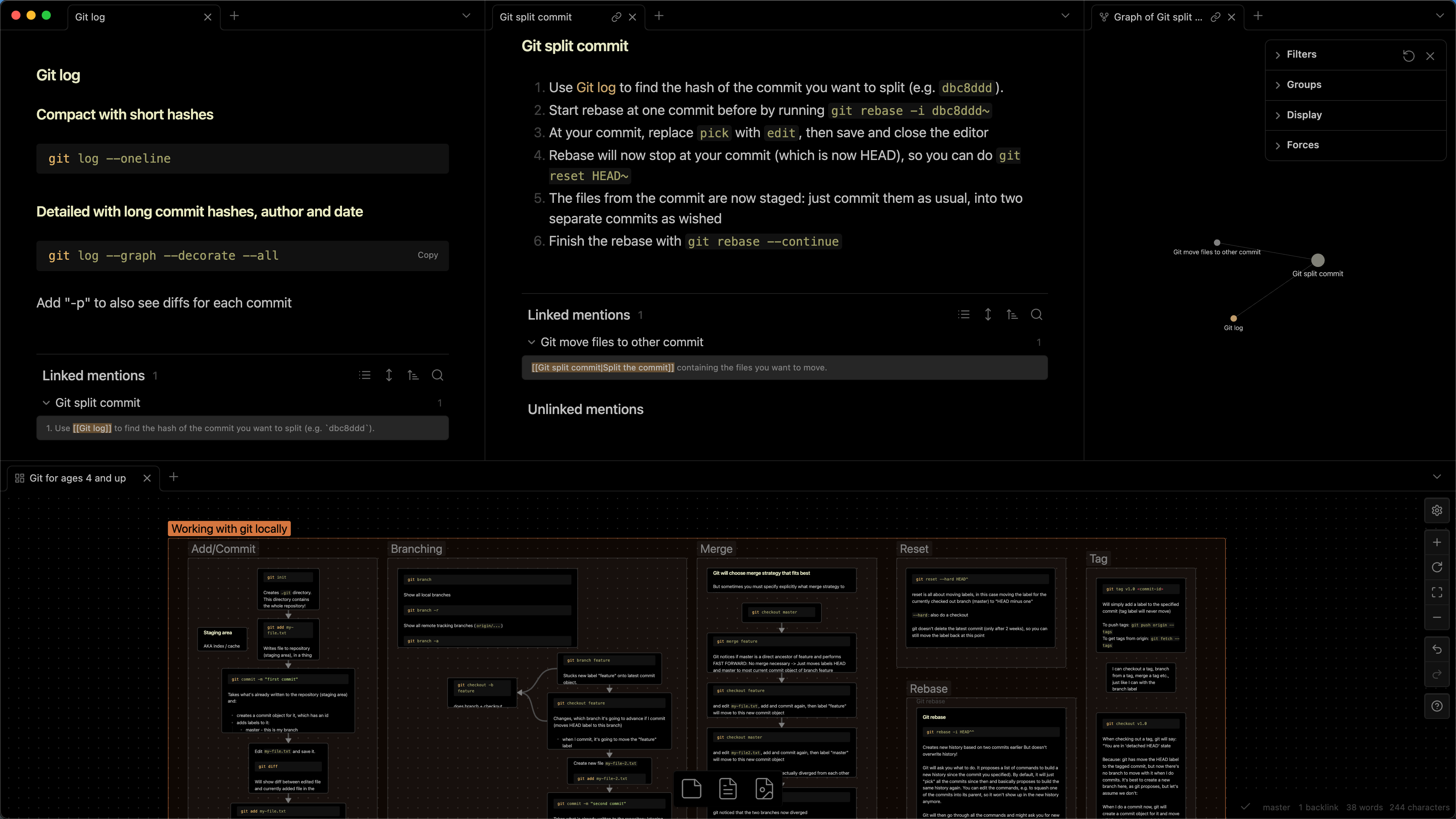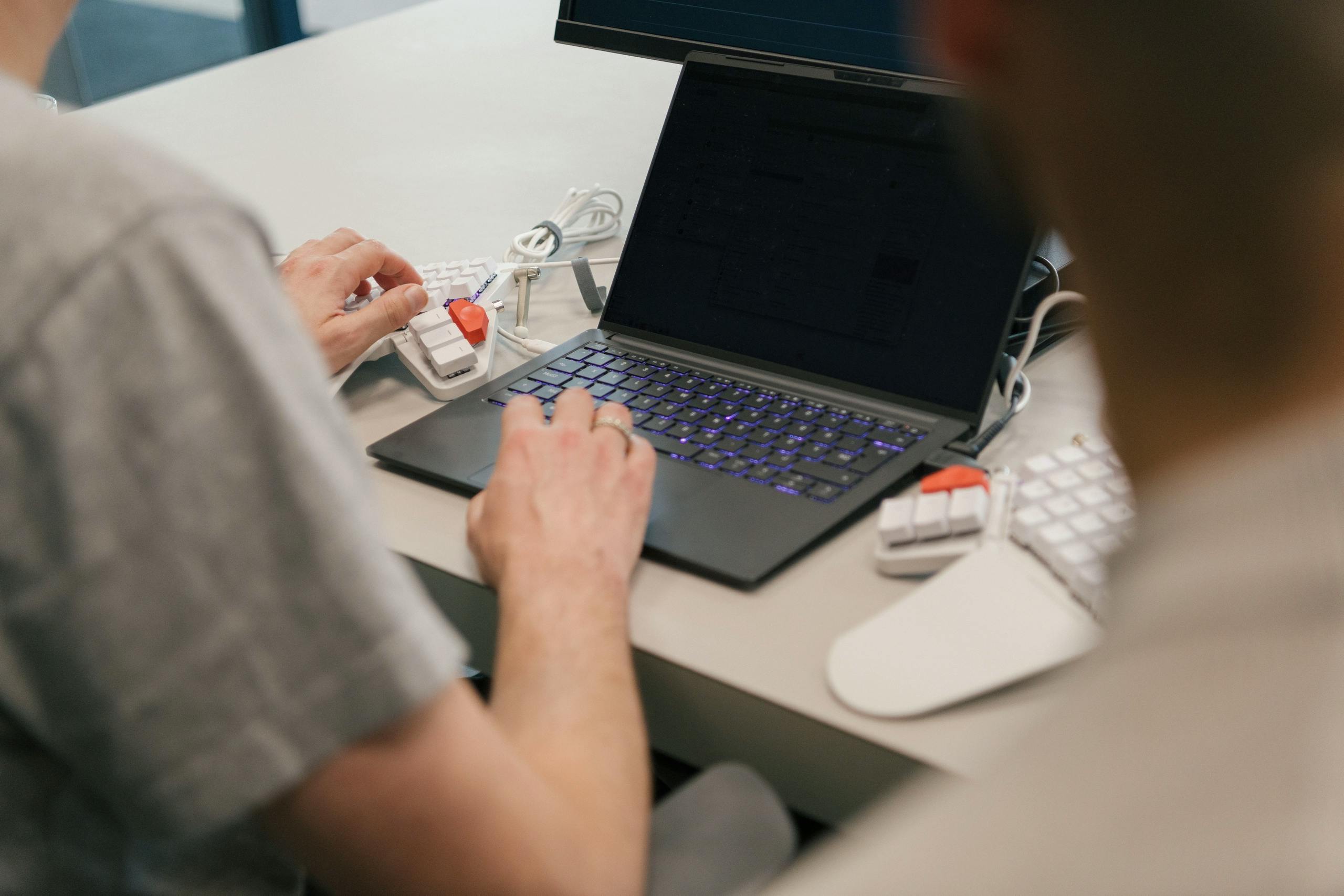- SOFTWARE ENGINEERING
Git-Delta
If you use Git via the terminal, here's a quick tip that might make your workflow easier.
I'm now two years into my note-taking experiment: having a single digital place where I can comfortably think about, formulate and interconnect anything I learn.
Samuel
Software Engineer

Having a single, fun to use place for knowledge management encourages me to actually sit and think about stuff that's important to me. Instead of always giving in to the next-best distraction (social media, sleeping, eating, watching moving images, ...).
If I have a thought or learning I want to capture, I'm not held back by a barrier in my head, such as the question: "Where do I put this thought now, so I can find it again?". Because I know where to put it: in my single personal knowledge management space!
In the long run, it's like a journal: I can take a look into my past experience, into things I would have otherwise already forgotten. This way, I can link my past knowledge to my present mind without having to spend hours searching through folders scattered across my basement or computer.
A specific example from my personal life: Reading and studying the Bible is one of my dearest things to do, since I believe God reveals himself through it. In my digital notes, I'm able to reference, highlight and interlink its verses, which helps to understand the connections within the book and the connections to my own life. That's also very valuable when preparing to share thoughts with others, e.g. preaching in my local youth group! The same benefits also apply for learning about any other topic, be it software development, history, cooking, music or whatever else you're interested in.
The following mindset is toxic:
I'll just copy any useful information I find on the internet into my note database.
Copying Wikipedia articles into my notes doesn't mean I understood them or "learned" something new. My focus should not be »getting more content into my notes as fast as possible« but »actually learning and understanding new things slowly and steadily«!
Another bad habit, I occasionally fell into, is to distract myself by over-engineering or over-organizing my note-taking setup instead of actually writing valuable notes about real topics.
Sometimes I demotivated myself by being too short-sighted:
I don't have enough knowledge and the few notes I have are messy. I need to be better NOW, but feel overwhelmed.
When such thoughts come up, I have to remind myself that it's a step-by-step process, same as life! My note-taking setup and notes are evolving over the years, it's fine to have it imperfect now.
At other times, I demotivated myself by being too long-sighted:
I will die someday anyway, could be tomorrow. Why bother about managing my knowledge, it'll be worthless once I'm dead. Also, my learnings in software development now will be worthless in just a few years, because technology changes so fast.
On the one hand, I think it's important to keep in mind the transience of my own life on this earth, to avoid over-investing my precious time into knowledge management – life is more than just gathering as much knowledge as possible! But I shouldn't let that prevent me from learning and having a solid note-taking setup as a helper – even if some of my notes will get outdated at some point or never be looked at again.
My notes are in a single ordinary folder that I keep in a repository on GitHub. The folder simply contains lots of Markdown files, a flavor that also allows inline HTML elements and e.g. LATEX math. As a developer, I'm very used to writing in Markdown syntax anyway. Each Markdown file is a thought or topic. Files can be linked among each other using Wiki-Links, e.g. `[[Jest multiple configs]]`.
Instead of creating many subfolders, I use links to cluster/categorize my files. So I can e.g. start by just creating a new Markdown file in empty space, free floating, not categorized, but maybe already linked to some other notes (which might not even exist yet). Over the years, I might create notes that are somehow related to the thought in this Markdown file, connected through links. At some point, I can formulate overview notes, explain how certain things belong together, e.g. »statistical measures« that I encountered over the years.
I do have one folder though: a »timestamps« folder, in which each filename starts with a date, like in a journal. Each file is a note that is specifically bound to a date, e.g. a To-Do list of things I planned for that day, or a memorable experience.
I can place To-Dos anywhere in my notes (`- [ ] some todo`) and have a central To-Do note that gathers and displays all of them in a single list.
I choose the tool Obsidian. It makes writing, linking, navigating and searching through my Markdown notes fun and pretty (as opposed to e.g. just using a regular text editor or IDE like IntelliJ or VS Code).

What I appreciate about Obsidian:
- Completely local by default: Obsidian just works on a local folder I point it to, it doesn't automatically sync my files to its own cloud. - Doesn't depend on some proprietary text format, as opposed to e.g. Microsoft OneNote. That means, if Obsidian dies, I can simply use another tool to read my Markdown files. - Live preview of Markdown (hiding the ugly parts of the Markdown syntax). - Extensible: plugins can be written in Typescript, there's a large active community which uses Obsidian passionately and develops useful plugins, e.g.: - Dataview: visualizing data queried from all over my notes. - Leaflet: embedding leaflet maps into my notes. - Obsidian Canvas or Excalidraw: drawing / sketching on a digital whiteboard (this goes past Markdown of course). - My own personal plugin to adjust Obsidian specifically to my requirements. - Obsidian mobile app: I can have my notes available while traveling, though I prefer to have a real keyboard for proper writing (on Android, I use the app Termux to pull/push from/to GitHub)
I'll keep and further evolve my personal note-taking space, as an encouragement to keep on learning and connecting present thoughts and experiences to the ones of my past.
If you use Git via the terminal, here's a quick tip that might make your workflow easier.
How to use Templace Literal Types to increase safety and reduce work.
Responsive CSS styling based on parent containers instead of browser window size.
Homeoffice & Selbstorganisation - Wie am effektivsten bewältigen?

Career
(Type)
Festanstellung, Vollzeit
(Location)
Stuttgart